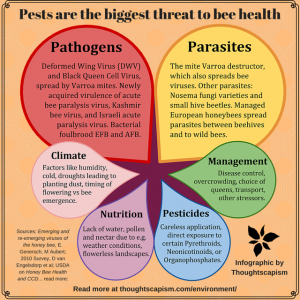One of my favorite topics to write about, and one that constantly gets attention and is riddled with myths, is the topic of GMOs. There is also a lot of myths surrounding the health of bees, while media sensationalism tends to overpower the facts.
The fact is that, according to the USDA, the honeybee population is actually at a 20-year high. Colony collapse disorder was an issue that had originally affected the bees in 2006, however much has been done to alleviate this problem. There were many factors that contributed to their decline, such as habitat loss, varroa mites, bad management, chemicals, and predators.
The anti-GMO crowd likes to tout GMOs as a huge factor to bee death, but this couldn’t be further from the truth. The reality is that GMOs allow farmers to use substantially less chemicals, and it is thanks to modern crop genetics that farmers are using fewer and safer chemicals than ever before. Before GMOs, corn and cotton farmers (as an example) had to spray insecticide, but thanks to the Bt genetics, insecticides are often no longer needed. GMOs usually possess traits of herbicide tolerance, but herbicides harm plants, not insects. Insecticides are used to control insects.
There are many laws and regulations in place to protect our pollinator friends. In Iowa, where I live, for example, we have what is called the Iowa Bee Law. If we are going to spray, we must notify local beekeepers, and beekeepers are required to be registered with the county. Communication is key, and sometimes certain agrichemicals must also be sprayed at night when the bees are not foraging, to protect them. The reality is that a majority of farmers cannot have good yields without the bees to pollinate them. It is in every farmer’s best interest to be as responsible as possible around them; we all care about beneficial insects.
It’s important to note that the scenarios just mentioned would not be specific to GMOs since GMO crops tend to use less chemicals. Regardless of plant breeding method, products used to improve modern farming that could potentially harm bees could be used in organic or non-GMO — it just isn’t that black and white. So it is irrelevant to blame GMOs when it really doesn’t matter. Farm chemicals have been used in agriculture for over 4,000 years, but technology has made them better and safer over time.
While certain agrochemicals could potentially harm bees, it’s important to note the risk is extremely small. In the grand scheme of things, their biggest threats are habitat loss, overpopulation of hives, insect infestation and natural predators, harsh winters, weather patterns, and varroa mites, to name a few. Humans in general can be guilty of killing bees for fear they may get stung, however honeybees are quite docile by comparison.

The varroa mite issue has been a big one and one that beekeepers are always on the lookout for. Medicine may be added to hives to prevent this awful bee disease, but science is taking it a step further: GMO bees.
Yes, you heard that right. Scientists are engineering bees through genetic modification, which could enable bees to be immune to the disease — think of it like vaccinations for them. This is a long and complicated process, but once completed, it could improve bee health by leaps and bounds, thus improving their survival. If you ever hear that bees are harmed by GMOs, don’t be “stung” by the myths. Now you know what the “buzz” is really about.
Michelle Miller, the Farm Babe, is an Iowa-based farmer, public speaker and writer, who lives and works with her boyfriend on their farm which consists of row crops, beef cattle, and sheep. She believes education is key in bridging the gap between farmers and consumers.


